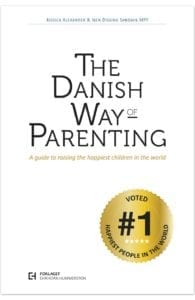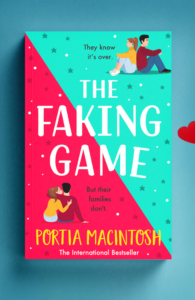Denmark, a small country famous for Hans Christian Andersen and the Little Mermaid, has consistently been voted as having the happiest people in the world for over 40 years in a row. In 2013 they were, again voted in first place by the World Happiness Report. What is the secret to their satisfied success? This deeply insightful book takes a look at the way Danish children are raised and offers a profound parenting theory that claims to be the at the crux of their continued happiness.
The Danish Way of Parenting by Jessica Alexander and Iben Sandahl Review
How to Raise the Happiest Kids in the World…
A great secret is out! The Danes have mastered the perfect formula for creating shiny, happy children. But this is nothing new. In fact, the Danes have long known about this magical elixir. And now, so can every other nation on the planet, thanks to a brilliant new book written by American author, Jessica Alexander and Danish psychotherapist, Iben Dissing Sandahl.
For it turns out there are no bad children. Just bad behaviour. And sloppy parenting. In many cases a complete lack of common sense, too. In all cases a total need to re-discover our own inner child as parents and teachers; to empathise, cosy up, and introduce more fun and togetherness, less competition and trumpet-blowing – in the literal sense – in the family and academic lives of our children.
Remove your cultural glasses
Is the open invitation of this book. For The Danish Way requires a degree of open-mindedness, the ability to leave our preconceptions and previously concrete-formed ideas at the front door. We enter a parenting world quite unlike anything we have contemplated before. So, intrepidly, put your judgment to one side and wade into the delightful, oft surprising, and uplifting text.
Sandahl and Alexander take us on a journey encompassing a broad spectrum of concepts, whose foundations contribute to the happiness of a nation. From examining cultural differences and paradigm shifts, to the importance of play (a chapter which, naturally, features Lego… and so much more besides), to authenticity and the art of keeping things ‘real’, as well as the alternatives to using ultimatums. No stone is left un-turned in this eye-opener of a read.
Psychology mirrors spirituality
One of the things I love most about this book is its many parallels with the Law of Attraction. And the following quote sums this up perfectly:
“Good begets good. Bad begets bad. Out of control begets out of control and calm begets calm.”
A simple maxim perhaps. But oh, so true. And oh, so easy to forget in our cultures and societies with their focus on discipline and order. However, what we give out, we do get back. If we want our children to be well-adjusted individuals, then screaming, hand gestures as we fly off the handle, critique and being uber competitive, helicopter style parents is categorically not the answer.
Teachers take note!
The Danish Way gives us an extraordinary glimpse into everyday classroom life in Denmark. And it is truly wonderful. Danish teachers use the differentiere method whose premise is: each child is unique, and as such, a one size fits all system is flawed.

Our children are not cogs in a machine to be tarred with the same brush. Excuse the synonyms. But it is something I have always believed myself, and I’m ecstatic to find that the Danish school system has long been on the case for meeting the needs of the individual child. By the same token, you won’t find punishment in any Danish school.
When behaviour needs to be changed, the students themselves have long ago (at the beginning of term) decided together upon the appropriate action to be taken. Not the teacher. How refreshing is that? How democratic is that? I could write a whole chapter on the merits of schools in Denmark, but one of the techniques I most love and have learned from this book is that ‘ADHD’ or hyperactive children, far from being labelled in the negative and disruptive way that has become the norm in most cultures, are understood on an individual basis and catered for effectively with some of the most common sense methods; ball cushions promoting better posture and levels of concentration, fidget cushions, cuddle things… and running laps around the school playground to expel excess bursts of energy.
The Danes know that it is unrealistic, unreasonable even, to expect a child to remain seated and mentally alert for copious amounts of time. The Danish Way is nothing short of a revelation.
Re-framing
The Danish Way also teaches us a really wonderful tool, something which I am already putting into practice in my own life, as well as that of my children. And that is the method of re-framing situations. Rather than continuing to look at a scenario or experience we have previously labelled as ‘bad’ in the same negative way, let’s put a new frame on the situation and zoom in on the things we may have missed first time round.
Have we considered the benefits that came from a failure? Have we credited ourselves for the lessons learned? Have we considered that while X was the outcome, at least Y and Z didn’t take place? There are so many things to be grateful for after all! Sandahl and Alexander liken this technique to being in an art gallery. Our first perception of a painting is one impression. But look again, really study the features; the blurring of the lines, the previously overlooked background activity and suddenly, a whole different perspective, a whole different story becomes apparent.
Sometimes it is even humorous! How many recent festive get-togethers could have been so much more fulfilling with a brand new frame on them? When we take off our regular ‘prescription glasses’ with our extended families in particular, we can enjoy a stress and drama free time by using empathy, re-framing and even pre-framing…
As Pollyannaesque as this may sound, it’s what psychologists would refer to as ‘Realistic Optimism‘. It’s restricting the use of limiting language, it’s keeping tabs on negative thought patterns before they spiral out of control, it’s re-writing a more loving narrative about ourselves (and our children) as we script the movie that is our life.
Cultivate cosy
Hygge (pronounced ‘hooga’) is an important everyday activity in Denmark, and actually, something I didn’t realise I am already integrating with little effort most days of the week in my own family’s life. The authors say it best:
“It’s a feeling as well as a way of being. It is eliminating the confusion and hysteria of all else. It is choosing to enjoy the most important, meaningful moments of our lives – those with our children and family and friends and respecting them as important. It is keeping them simple, making the atmosphere nice and leaving our troubles behind.”

Hygge is board games by a roaring log fire, cups of cocoa in hand. Hygge is six under a duvet in PJs on a rainy afternoon reading picture books and laughing. Hygge is warm freshly baked bread smothered in butter and dunked in soup, shared around a simple, but beautifully laid table; soothing music in the background, candles flickering. Hygge is snuggling with pets. Hygge is … fill in your blanks.
Hygge is personal to each of us, yet hygge is inclusive. And hygge is everything!
Hygge can be found in the family home, yes. But hygge is also intrinsic to organisations and institutions, teamwork in the office, watching the local football team and yelling your support in sync with the crowd, a singsong at the church, a read along at the kids’ library, a weekly meet up for new mums and their babes. Hygge is the ultimate sense of belonging, support, being at ‘one’ with everything and everyone. Hygge is pure positivity. Sure, we engage in hygge now and then in our respective cultures, but how many of us honour it like a ritual day to day? Maybe it’s time we did. I know – unbeknownst to my family – I vow to!

I predict HUGE things for this book.
I really do. If the ‘grown-ups’ of every nation put the principles outlined in The Danish Way into practise even fifty percent of their waking lives, oh, the potential change to humanity…
A grand claim?
No, I really don’t think so. Sometimes a book has the power to literally re-sculpt the world as we know it, bringing about changes to the next generation which could even make the word ‘war‘ a concept of the dim and distant past. The Danish Way of Parenting really is every adult’s Bible.
The Danish Way of Parenting is published by Forlaget Ehrhorn Hummerston
ISBN: 978-879255-9-319








